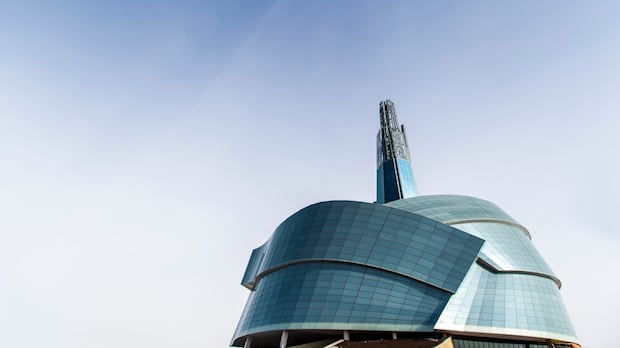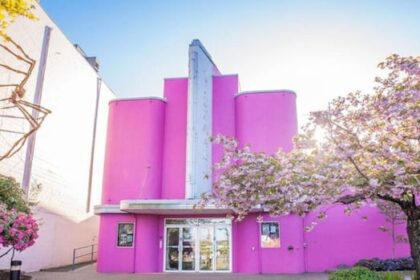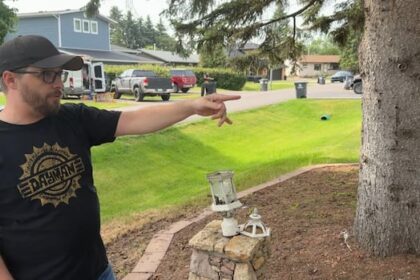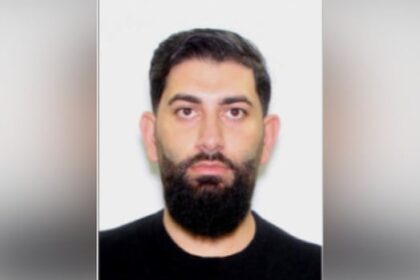An exhibit recounting personal experiences of Palestinian Canadians who fled or were forced from their homes in 1948 will open in Winnipeg next year, but news of the coming display is already having a polarizing effect among groups in the Jewish community. The Jewish Heritage Centre of Western Canada, Jewish Federation of Winnipeg and Centre for Israel and Jewish Affairs are speaking out against the plan, while a coalition of three other Jewish organizations calls the message of the exhibit “morally urgent.”The CMHR announced a series of upcoming exhibits this week, including Palestine Uprooted: Nakba Past and Present, which will open to visitors in June 2026. “Kudos to the museum for having the courage to tell the story and not because they’re favouring the Palestinians or the Israelis,” said Ramsey Zeid, president of the Canadian Palestinian Association of Manitoba.”This is a human rights story that really needs to be shared.”The exhibit will focus on those who have lived through the Nakba, an Arabic term that translates to “catastrophe” and is used by Palestinians to describe a defining moment of their history. Ramsey Zeid, president of the Canadian Palestinian Association of Manitoba, praised the Canadian Museum for Human Rights on Thursday ‘for having the courage to tell the story, and not because they’re favouring the Palestinians or the Israelis.’ (Travis Golby/CBC)Hundreds of thousands fled or were forced out of their homes during the 1948 Arab-Israeli war. Israel disputes some of the circumstances and perspectives surrounding those events.”This exhibit isn’t a historical retrospective,” Isha Khan, CEO of the museum, told CBC News.”This exhibit is about the experiences of Palestinian Canadians who have lived through forced displacement and their families, so it’s told from their perspective.”The Jewish Federation of Winnipeg, the Centre for Israel and Jewish Affairs and the Jewish Heritage Centre issued statements raising concerns about the museum not engaging the broader Jewish community for input and raised worries about the exhibit potentially overlooking important scholarship and historical context.”This has left many of us concerned that the exhibit may present a narrow and one-sided picture of this complex history,” Paula Parks and Jeff Lieberman, chair and president of the Jewish Federation of Winnipeg, said in a statement.”It also carries real risk during a period when antisemitism in Canada has risen to levels never seen before.”The Centre of Israel and Jewish Affairs said it has offered to connect the national museum with experts who may help ensure the exhibit is balanced and “reflects the experiences of all refugees, including the more than 850,000 Jews forcibly displaced from long-established communities across the Middle East and North Africa.””As currently framed, the proposed direction will deliver an incomplete and unbalanced narrative, one that omits Jewish refugee experiences entirely and will carry reputational consequences for the museum,” the CIJA said in a statement.Belle Jarniewski is executive director of the Jewish Heritage Centre of Western Canada and the Manitoba Institute to Combat Antisemitism. (Jaison Empson/CBC)Belle Jarniewski, executive director of the Jewish Heritage Centre, said there should have been meaningful consultation with the Jewish community.She worries the exhibit might not reflect historical and present-day geopolitical realities on the ground in Israel through “balanced scholarly research” amid an “unprecedented surge in antisemitism.””This exhibit will likely exacerbate our situation,” Jarniewski said in a statement.The centre is also concerned the exhibit might not present information about one-fifth of the population in Israel comprising non-Jewish minorities, including Christian and Muslim Arabs, Druze, Circassians and Samaritans, Jarniewski said.”Their presence in Israel demonstrates their continued existence as Palestinian Arabs in Israel, which complicates the totalizing notion of the ‘Nakba’ as it is most widely understood around the world, mostly by enemies of Israel and the Jewish People,” Jarniewski said in a statement.”This context is crucial to include. However, all this could have been understood, if the organized Jewish community had been consulted meaningfully from the beginning and not excluded from discussions.”WATCH | Palestinian Nakba exhibit coming to human rights museum:Palestinian Nakba exhibit coming to human rights museum A new exhibit on the Nakba, recounting the personal experiences of Canadian Palestinians who fled or were forced from their homes in 1948, is coming to the Canadian Museum for Human Rights. However, at least one Jewish organization is concerned it will lack historical and current geopolitical context.The Jewish Heritage Centre of Western Canada has collaborated with the CMHR in the past on work, including its Holocaust gallery and Holocaust Remembrance Day programming.Jarniewski says in light of the lack of adequate consultation on the Nakba exhibit, the centre will withdraw from a planned Jan. 27 Holocaust Remembrance Day program and won’t be planning any more partnered exhibitions with the museum.Khan said the museum has been honoured to work with the Jewish centre for 10 years and is sorry to hear it withdrew from programming.A coalition of three other Jewish organizations has come out in support of the exhibit.”The CMHR exhibition aligns with decades of rigorous academic research,” Jonah Corne of the Jewish Faculty Network, a group of Jewish professors in Canada concerned that legitimate criticism of Israel is being labelled antisemitic, said in a joint statement.Independent Jewish Voices Canada, United Jewish People’s Order of Canada and the Jewish Faculty Network commended the museum for presenting the first large-scale exhibit in Canada on the Nakba.”Recognizing the Nakba in a major public institution creates space for honest conversation, without which reconciliation and long-term peace are impossible,” Corne said. “Our responsibility as scholars and as Jews is to support truthfulness in public memory.”Iso Setel, spokesperson for Independent Jewish Voices, said “understanding the history of the Nakba is morally urgent” and right now “we are watching a live-streamed genocide.”This fall, a United Nations Commission of inquiry found Israel has committed a genocide. Israel’s ambassador to the UN called the report “scandalous” and “fake,” saying it had been composed by “Hamas proxies.”Prime Minister Mark Carney’s government hasn’t recognized the conflict as a genocide, though it did recognize Palestine as state in September.Local playwright Daniel Thau-Eleff, a longtime member of Independent Jewish Voices, said he finds the level of opposition to the exhibit “beyond upsetting” considering how little detail has been released so far. LISTEN | Jewish Winnipegger on support for Nakba exhibit:Up To Speed9:30Jewish Winnipegger Supports Nakba ExhibitA Jewish Winnipegger supports having a Nakba exhibit at the Canadian Human Rights Museum. Find out why, that’s coming up.”If we care about peace and safety, there’s just no good to anyone from denying history,” Thau-Eleff told Up to Speed host Faith Fundal.”If we’re going to shut our ears to that then we’re not only diminishing our own humanity, we’re not only persecuting our Palestinian relatives, we’re also giving up on our Israeli relatives and any hope of them having a future of peaceful coexistence.”Sarena Sairan, executive director of the United Jewish People’s Order of Canada, says supporting the CMHR exhibit aligns with “Jewish values of empathy, justice and accountability.””Acknowledging the Nakba does not attack Jewish identity; it strengthens our moral integrity,” Sairan said in the joint statement. Isha Khan, CEO of the Canadian Museum for Human Rights, said the Palestine Uprooted exhibit is still in development and will get the same academic and curatorial rigour as all exhibits. (CBC)Winnipeg philanthropist Gail Asper, who played a critical role in bringing the CMHR to Winnipeg, shares some of the same concerns about the inclusion of “rigorous scholarship” and the need for consultation with the Jewish community.”I was extremely shocked and disappointed to see that the museum was going ahead with an … exhibition on the Palestinian refugee situation without … equal time given to the fact at the same time that 700,000 Palestinians were displaced, 850,000 Jews were totally ethnically cleansed from the Arab lands in the same war,” Asper told Radio-Canada.In 2003, her father, philanthropist Israel Asper, and partners announced plans for the Canadian Museum for Human Rights. Months later Asper, founder of the CanWest Global Communications media empire, died.Gail took over the campaign. Gail Asper, president and a trustee of The Asper Foundation, speaks at the grand opening of the Canadian Museum For Human Rights in Winnipeg on Sept. 17, 2014. (John Woods/The Canadian Press)She said when her father was asked about whether the museum would someday have an exhibit on the Palestinian experience, he said he had “no problem with it” so long as the “the expulsion of the Jews from Arab lands would be included as part of this whole tragic story.””I would love for this exposition at long last to be the opportunity that we’ve been waiting for to bring groups together, and have shared understanding, acknowledge each other’s hurt and then move forward,” said Gail. “I think that’s what this museum was created to do.”Asper said she has expressed her concerns to Khan and the museum’s board chair.”As a museum for human rights, we share the community’s concerns about rising antisemitism and remain steadfast in our commitment to providing Holocaust education and programming that combats antisemitism,” Khan said in a statement.”The exhibit is currently in development and is undergoing the same academic and curatorial rigour as all of our exhibits — and we encourage folks to come and see it when it opens next year.”
Thursday, 5 Mar 2026
Canada – The Illusion
Search
Have an existing account?
Sign In
© 2022 Foxiz News Network. Ruby Design Company. All Rights Reserved.
You May also Like
- More News:
- history
- Standing Bear Network
- John Gonzalez
- ᐊᔭᐦᑊ ayahp — It happened
- Creation
- Beneath the Water
- Olympic gold medal
- Jim Thorpe
- type O blood
- the bringer of life
- Raven
- Wás’agi
- NoiseCat
- 'Sugarcane'
- The rivers still sing
- ᑲᓂᐸᐏᐟ ᒪᐢᑿ
- ᐅᑳᐤ okâw — We remember
- ᐊᓂᓈᐯᐃᐧᐣ aninâpêwin — Truth
- This is what it means to be human.
- Nokoma











